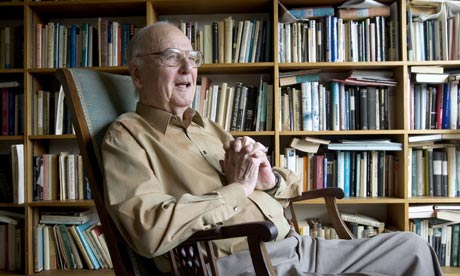“There was a period, when I was a young lecturer, when there were literary critics with immense reputations. I’m thinking of people like Northrop Frye, for example, who ruled the world with Anatomy of Criticism. It’s never cited or quoted anywhere now.”
Sir Frank Kermode, Interview with John Derbyshire, New Statesman, 5 February 2010


Kermode seems to make a habit of going out of his way to dismiss Frye — and, as is usually the case, does so by misrepresenting him. Consider this from an interview published just last summer:
“Regarding Northrop Frye, he really had a world-beating system and was a very powerful mind. He was a man of extreme and orderly intelligence, and I admired him a good deal. As for his critical disappearance, I can only guess at an explanation – namely that when people really did begin to consider the world-beating system that he built, they began to see that they didn’t want it. He ruled out value judgements. When you do that you are reducing the interest of literature. You just have a kind of model for the whole of literature, you just have a system which places everything in the right kind of cog-hole. And also, of course, he grew more and more interested in the Bible. That shouldn’t have harmed him much in America but I think it’s fatal here, where nobody wants literary criticism about the Bible.”
“System”? “Ruled out value judgments”? “Literary criticism about the Bible”? “Cog-hole“? There is no such Frye and never has been. Sir Frank has had many years to get it right, but is apparently willing to go out on this note.
As for literary criticism of the Bible, how about Kermode’s own The Genesis of Secrecy, as well as the book he edited with Robert Alter, The Literary Guide to the Bible? Wouldn’t those qualify?
Incidentally, Kermode’s most extensive treatment of the topic is “Northrop Frye and the Bible” in Ritratto di Northrop (Bulzone: Rome, 1989), 105-20.
Re Kermode’s point about the status of criticism, it certainly seems to me to have lost a lot of its cultural prestige. But Terry Eagleton, whatever one thinks of him, still commands attention. His book _Reason, Faith, and Revolution: Reflections on the God Debate_ has been widely discussed – and widely distributed. Professor Eagleton and Yale UP must be making some money out of it!
Re Michael’s comment: is Kermode – the author of _The Genesis of Secrecy_ and _The Literary Guide to the Bible_ – speaking autobiographically when he talks about the fatal effect of literary criticism about the Bible in England?
Re: the Bible. My point was that The Great Code is not, as Kermode says, “literary criticism about the Bible”. It is literary criticism and the Bible. Even though Frye says this repeatedly and designs his argument accordingly, Kermode has evidently decided to ignore him.
But Michael, Frye begins _The Great Code_ “This book attempts a study of the Bible from the point of view of a literary critic.” Even though he makes distinctions between the Bible and works of literature, it seems to me that _GC_ is a literary study of the Bible, which is more or less what Kermode says. Especially if you take his “literary criticism” in a broadly inclusive sense, as Frye uses the term in the _Anatomy_.
Yes, Russell, The Great Code is the study of the Bible from the point of view of a literary critic, but it’s not a literary study of the Bible, and Frye is quite explicit about that. He’s demonstrating — as a literary critic — the full range of potential meaning in language, and — thanks to the Bible — he is able to posit the “literature plus” dimension of kerygma.
Can we agree to call _GC_ a mixture of literary criticism and idiosyncratic theology? Or is there something about kerygma that I’m still missing here? (I’ve always found it a very elusive and problematic concept in Frye.)
Laughing! I guess we can. Although is the theology all that idiosyncratic? Frye was theologically trained, after all, and his experience as a literary scholar allowed him to see beyond the ideological limits of theology. What he perceived to be the “literature plus” element of the typologically generated kerygma of the Bible is consistent with the visionary direction that literature moves in, but with the “hypothetical” element falling away to reveal the impetus of primary concern: the “human form divine.”
Frye repeatedly said — and when Frye repeats something, he really means it — that everything he knew he learned from Blake. I take him at his word. Come in, Bob Denham. Calling Bob Denham…
Dear Michael Happy,
I understand why you thought better of your original phrasing of your initial comment, which I saw before you thought better of it. It was veddy funny, and I can’t help but reflect that, had Sir Perceval piped up at the correct time, the infertile Fisher King would have been healed and Sir Perceval would not have spent the remainder of his post arguing over the velocity of an unladen swallow.